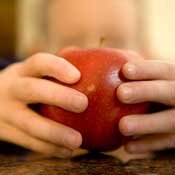Brain science is exploding with new research showing why it's vital to not only feed your stomach, but to feed your brain. In Doctors Health Press last week, Dr. Victor Marchione, author of The Food Doctor newsletter, says that anyone who wants to be healthier or lose weight must pay attention to what your brain needs.
Brain scans have shown that when glucose levels drop in your body, the hypothalamus—a part of your brain in your prefrontal cortex that regulates emotions—starts telling you that you want to eat, eat now and eat unhealthy foods such as those with high-sugar content. Your brain, in essence, loses its ability to say no to bad food.
"This weakened response was particularly striking in the obese when shown high-calorie foods. Obese individuals may have a limited ability to inhibit the impulsive drive to eat. That becomes overbearingly so if glucose levels drop," Marchione writes. He adds that cortisol, the stress hormone, then jumps in to make it even harder to say no to bad food.
He suggests making strong efforts to eat foods such as fresh fruit to keep your blood-sugar levels high. "If you think fighting your waistline is hard, try fighting your brain," he says.
Brain Food for Kids
Dump the fish sticks. If you want your kids to be smart and calm and focused, you've got to feed their brains, and from an early age. (This will also make our state smarter, safer and more successful.)
Researchers, including those at http://www.YourFamilyClinic.com recommend the following brain foods for children—the more organic and natural, the better:
• Omega-3-rich: Salmon, sardines, flax oil, walnuts, mackerel, hemp milk, olive oil, leafy greens, pumpkin seeds, soybeans, soy butter, soy bean oil.
• Foods high in antioxidants (healthy chemicals that clean the brain of free radicals that cause cell deterioration) can dramatically reverse memory loss, restore motor coordination and balance. These foods are raisins, berries, apples, grapes, cherries, prunes, colorful vegetables and spinach.
• Complex carbs: Peanuts and peanut butter (natural brands now taste good), dried apricots, yogurt, oat bran, dried beans, bran and whole-grain cereal (avoid the sugary ones), sourdough bread. Include vinegar or lemon juice in your recipes to help suppress a child's sharp rise in blood sugar.
• Avoid polyunsaturated fats, hydrogenated oils and transfats: Corn and cornseed, safflower, and sunflower oils; processed foods; margarine (butter is better); TV dinners; most microwave popcorn, French fries (unless baked or cooked in healthy oil.) Remember that fast food may seem cheaper, but is very expensive later in medical bills, intelligence and good health.
More stories by this author
- EDITOR'S NOTE: 19 Years of Love, Hope, Miss S, Dr. S and Never, Ever Giving Up
- EDITOR'S NOTE: Systemic Racism Created Jackson’s Violence; More Policing Cannot Stop It
- Rest in Peace, Ronni Mott: Your Journalism Saved Lives. This I Know.
- EDITOR'S NOTE: Rest Well, Gov. Winter. We Will Keep Your Fire Burning.
- EDITOR'S NOTE: Truth and Journalism on the Front Lines of COVID-19


